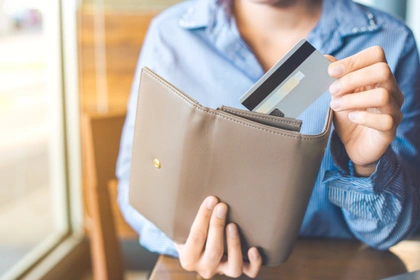How do credit card interest-free periods work?
Credit card interest-free periods allow you to make purchases without paying interest for a set time. Here’s how they work:
-
Billing cycle. Your credit card has a billing cycle, usually about 30 days long.
-
Interest-free period. From the day you make a purchase, you get an interest-free period. This is typically 20 to 56 days. If you pay your card in full during this period you won't be charged interest.
-
Grace period. If you pay your entire balance by the due date shown on your statement, you won't pay any interest on the purchases made during that billing cycle. This is also known as paying within your grace period.
-
If you don't pay in full, you’ll be charged interest on the remaining amount. New purchases might also incur interest immediately until the full balance is paid off.
How long is the standard interest-free period?
A standard interest-free period on credit cards is usually between 20 to 56 days. It starts when you make a purchase and lasts until the payment due date for that billing cycle. If you pay your balance in full by the due date, you won’t be charged any interest.
How long is an introductory interest-free period?
An introductory interest-free period is a special promotion offered by some credit card companies. These periods vary in length and depend on the card you choose. They can be applied to balance transfers, new purchases, or both, and last from a couple of months to over a year.
How to make the most of the interest-free period
Maximising the interest-free period on your credit card can help you manage your finances and avoid interest charges. Here’s how:
-
Pay your balance in full by the due date each month. This way, you won’t incur any interest charges on your purchases.
-
Know when your billing cycle starts and ends. If you have to make a purchase, doing so at the beginning of the cycle means you can maximise the interest-free days.
-
Set up payment reminders or alerts on your phone or through your bank to avoid missing payment due dates.
-
Use Direct Debits to automatically pay the full balance each month. This ensures you never miss a payment and avoids interest charges.
-
Familiarise yourself with your credit card’s terms and conditions. Different cards may have different interest-free periods and rules.
-
Regularly check your statements to keep track of your spending and ensure you’re staying within your budget.
-
Avoid cash withdrawals as they usually don’t come with an interest-free period and often have high fees.
What other types of credit cards offer interest-free periods?
Lots of other types of credit cards offer interest-free periods, often as part of their features or promotional deals, including:
0% APR introductory cards:
-
How it works: These cards offer an introductory 0% APR (Annual Percentage Rate) on purchases, balance transfers, or both for a set period after opening the account. No interest is charged during the promotional period, making it useful for large purchases or consolidating debt.
-
Duration: Usually ranges from six to 18 months, depending on the card.
Balance transfer credit cards:
-
How it works: These cards offer a 0% APR on balances transferred from other credit cards for a set period. This allows you to pay off existing credit card debt without accruing additional interest during the promotional period.
-
Duration: Typically ranges from 6 to 21 months.
-
Note: A balance transfer fee (usually 3-5% of the transferred amount) might apply.
Buy now, pay later credit cards:
-
How it works: Some credit cards allow you to make a purchase and then choose to pay it off over time with a 0% interest rate for a set number of months. This can be an alternative to traditional instalment loans.
-
Duration: Usually ranges from six to 24 months, depending on the terms set by the issuer.
Store credit cards
-
How it works: Many store-branded credit cards offer promotional interest-free periods for purchases made at the store or its online platform. These deals often come with conditions, such as making minimum monthly payments or paying off the purchase within a set period.
-
Duration: Typically ranges from six to 24 months, depending on the promotion.
How can I avoid paying interest on a credit card?
You can often avoid paying credit card interest altogether by paying close attention to your billing cycle and managing your card well. Here are some tips for avoiding interest:
-
Pay your balance in full every month. When you pay off your balance by the due date, you benefit from the card’s grace period. This means you won’t be charged interest on purchases.
-
Understand your grace period. Most credit cards offer a grace period, usually 21-25 days, from the end of your billing cycle until the payment due date. During this time, if you pay your full balance, you avoid interest on new purchases.
-
Avoid withdrawing cash as this doesn’t usually have a grace period, meaning interest starts accruing immediately from the date of the transaction. Additionally, cash withdrawals often come with higher interest rates and fees.
-
Pay more than the minimum payment. While paying more than the minimum won’t necessarily prevent interest charges, it can help reduce the amount of interest you pay over time. By reducing your balance faster, you’ll accrue less interest, especially if you can’t pay the full balance.
-
Use 0% APR promotions wisely. If your card offers a 0% APR promotional period on purchases or balance transfers, take advantage of this to pay down the balance without accruing interest.
-
Set up automatic payments to avoid missing payments or accidentally carrying a balance. This prevents you from forgetting to pay and avoids interest charges.
-
Regularly monitor your credit card spending to ensure it aligns with your ability to pay the full balance each month. This helps avoid spending beyond your means, which can lead to carrying a balance and incurring interest charges.
Ocean Credit Card
See if it's a YES before you apply
- Up to £8,000 credit limit
- Checking won't affect your credit score
- Get a response in 60 seconds
Intelligent Lending Ltd (credit broker). Capital One is the exclusive lender.

Disclaimer: We make every effort to ensure content is correct when published. Information on this website doesn't constitute financial advice, and we aren't responsible for the content of any external sites.






